The Pareto Principle (80-20 Rule): Minimize the Effort, Maximize the Results
Have you ever wondered if there is a quicker, more efficient way to study, write a paper or learn a new skill? It exists, and it’s called the Pareto principle, or the 80/20 rule.
I discovered the Pareto principle as a language learner, and it helped me solve a problem that many language learners face.Being a perfectionist when it comes to language learning is one of the main reasons many people never end up using a language they’ve studied. They are paralysed by the thought of making a mistake. They don’t know all the words & all the grammar, therefore they “can’t” speak yet.
It’s sad how much this bogus mentality slows people down and even prevents them from ever trying.
I want to share a fundamental concept behind how I can speak languages shortly after arriving in a country, and progress so quickly. It is based on my interpretation of the 80/20 rule, also known as the Pareto principle.
Table of contents
- What Is the Pareto Principle?
- How to Apply the Pareto Principle to Language Learning
- How to Apply the Pareto Principle to Learning the Vocabulary You Need?
- Making the Most of What You Have With the Pareto Method
- With the 80/20 Rule, You Are Ready to Speak
- How Else Can I Help You Get Fluent Faster? Let Me Know!
What Is the Pareto Principle?
In its simplest form, the Pareto principle states that roughly eighty percent of consequences come from twenty percent of causes. In other words, you get 80% of the results from 20% of the work. This rule is applied in many fields.
Other interpretations of the numbers are also possible: for example, 80% of the wealth of a country typically belongs to 20% of its population.
In fact, the “Pareto Principle” was named after Vilfredo Pareto (1848-1923), an Italian economist who pointed out that about 80% of Italian land belonged to only 20% of the population. Joseph M. Juran, a management consultant, developed the term and concept while studying Pareto’s works.
I have used the principle in my personal and business life. When I decided to start my blog, I could have aimed for perfection and decided I needed to get as much expertise in writing blogs as I possibly could.
But did I spend years researching how to blog? Or took a degree course on how to become a writer? I didn’t do that.
I figured out what was the smallest amount of effort that I could apply to this business to launch it as quickly as possible.
I’ve done something similar with language learning.
Do the Numbers of the 80/20 Rule Matter?
You don’t have to be exact about the 80/20 part of the principle.
While there is some merit to using the number 80, the actual quantity doesn’t interest me too much. This is what you need to keep in mind: most of the end-results from a fraction of what you put into something.
From another point of view, you could argue that a certain percentage of a language (80%) is simply irrelevant to me in my day to day dealings (when about 20% of the language is used).
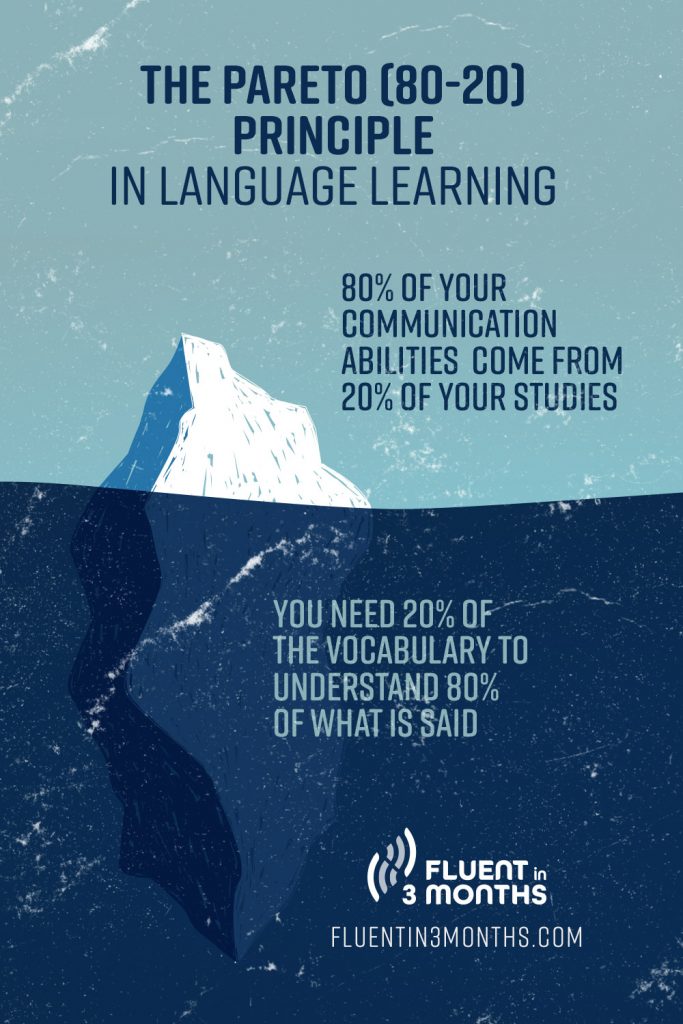
How to Apply the Pareto Principle to Language Learning
When beginners start learning a language, a lot of them get bogged down with complicated things like grammar.
Grammar is not something I suggest that you learn initially, or at least that you don’t put that much effort into as an absolute beginner.
If you’re starting off, it’s fine for your grammar to be choppy. If you say “me not go”, you are at least communicating. The sentence structure might not be perfect, but the meaning is clear.
As an absolute beginner, grammar is not going to make a big difference in your ability to communicate.
Another thing that fits in this unnecessary 80% of language learning is obsession with pronunciation. You do have to get a certain level of pronunciation so that people can understand you, but a lot of people get obsessed with trying to have native-like pronunciation.
You might think that if you don’t get the accent perfect at the start, you’ll never get it right because you can’t teach an old dog new tricks.I personally know this is absolute nonsense.
There are things like grammar and pronunciation that I have worked on much later in my language learning, and I have been able to get these to a very high level. As a beginner, however, it’s not necessary.
There is also a huge quantity of words you don’t need to start speaking a language.
How to Apply the Pareto Principle to Learning the Vocabulary You Need?
A non-Pareto approach to language learning would imply that you need to know everything before you can speak. If you don’t know how to say “aardvark” or “armadillo” in French or Chinese, then your level simply isn’t good enough.
I say differently. Many words like these are so uncommon and unlikely to show up! Not knowing them will make no difference at all in your life.
If you compare two natives of a language, where one knows the word armadillo and the other doesn’t, then will their lives really be that different given the same circumstances?
I extend this to slightly more common words: at the moment I don’t believe I know how to say “shoelace” in any of my target languages, although I’d recognise that word based on seeing and hearing it previously a few times and especially based on extrapolating thanks to the context and perhaps word etymology.
You don’t need to learn every single word as you come across it in your target language. I’ll give you two techniques to apply the Pareto principle to your language learning.
Vocab Vaults: My Personalized Phrasebooks
One of my favorite language learning techniques is to create personalized phrasebooks.
Let me give you an example.
I obviously need to know the word for Ireland because I’m from Ireland. On the other hand, I don’t necessarily need to know the word for Australia. I may eventually talk about Australia as an intermediate, but in most of my initial conversations I don’t need to know a word like that.
And to those who insist: “You might not, but you might,” I ask: am I more likely to need to know how to say “traveler” or “Australia”? Remember, we’re trying to minimize the effort here, all while getting better results.
I have to spend the time I have learning vocabulary I am sure I will use.
So here’s how you should go about it:
- Focus on vocabulary that is more directly relevant to you.
- Take into account the things that are most necessary initially and that you would be speaking about early on.
You can also create language islands to build up the vocabulary you’ll actually need and use.
Frequency Lists: Your Shortcut to Understanding 50% of the Language
Learning words related to you is important, but you also need to learn those very basic words that everyone uses. Words like “today”, “people”, and “to want”.
With many languages, you can understand about 50% of daily interactions by learning the 100 most common words. These are curated in frequency lists according to how frequently they come up in the language.
Lists like this exist for a lot of languages. At Fluent in 3 Months, we have one for:
You’d be surprised to see what you can do with very little vocabulary. Pair this with a good sense of understanding the context of what is going on around you and non-verbal communication, and you’re good to go!
Conversation Fillers and Conversation Connectors
There are some words and phrases that you can learn to make your conversations feel less robotic.
If you have a limited vocabulary, words like these help you hide it a little.
I’m talking about vocabulary like:
- so,
- that’s why,
- however,
- but,
- on the other hand,
- um,
- like,
- well,
- okay,
- right,
- you know.
Related learning: Conversational Connectors – How to Fake Having a Conversation Just After Starting to Learn a Language
Making the Most of What You Have With the Pareto Method
Here comes the moment to interpret the 80/20 rule as “do 80 with the 20 you learnt”. In other words, do a lot with the little you learnt.
How to Communicate Things on a Limited Vocabulary
Work around what you don’t know!
Take these examples:
- If you don’t know how to conjugate verbs in the past tense, just say “yesterday I eat” while waving behind you.
- If you don’t know how to say small yet, just say “not big”.
I have done this many times! Learning new languages in spoken contexts for as long as I have means that I’ve come up with many ways to get around not knowing a word. Sometimes, these are even good enough to even make the other person unaware that I’m using a workaround.
You can’t know everything, so try not to think about your limitations and try your best to figure out how to get my point across.
How to Understand What You’re Being Told When You… Don’t Understand Anything
Communicating with a limited vocabulary, that might work. But what about understanding what others say?
When you hear a reply, try to understand individual words (since getting the whole phrase will be out of reach). In addition to that, use the context the word is sandwiched into.
You will get a pretty good idea what the other person is talking about.
Is this a good strategy to keep forever? No. Even less so if you want to have deep, meaningful conversations in a language.
But saying that you can’t get value out of the beginner stage, and that it should be avoided entirely is an extreme, unnecessary approach for people too scared to try.
When you do it well enough, natives will not lose their patience with you.
Here in the Netherlands, I was warned that nobody would ever speak Dutch to me in the early stages. It turns out it was nothing more than lazy excuses from expats that weren’t trying hard enough, or doing it in an awkward way that makes the other person feel uncomfortable, regardless of their actual language use.
There are ways to make it more fun for the other person to listen to me.
With the 80/20 Rule, You Are Ready to Speak
I hate it when I hear people saying they’ll wait until they are “ready” before they speak. This is a procrastination technique motivated by nothing more than fear of failure.
Fail fast & fail often and you’ll succeed way more regularly.
Slipping up and making some mistakes while learning a language is totally natural. Avoiding doing it is avoiding using the language as it was meant to be used: for communication!
There will never be a day after years of pure study when you wake up, look at yourself in the mirror and realize that you suddenly start effortlessly speaking like a native. It’s ridiculous to consider such a thing if you haven’t already been practising.
Learn 20 words now and then use the hell out of them. Be imaginative. Then learn more words and you’ll see that it’s ever so slightly easier.
By the time you can hold an OK conversation, a few short weeks or months into intensive use with natives, you’ll be able to survive 80% of normal situations in that language, despite putting in way less than 20% of the work most people do to get to a similar stage after years.
It’s not the years you put in after all that make you successful.
Efficiency at its best
If this doesn’t float perfectionists’ boat, then frankly I don’t care. I don’t use my languages in exam situations where each mistake is a big red X. My priority is communication, and using the little I have imaginatively is how I do it. Necessity forces you to progress, so you will reach a higher level much quicker.
Mastering a language does take time. I have reached fluency in a language in a matter of months several times, but continue to try to improve on what I have. You will never reach a day when you say you are “ready” and your work is done. Fluency is not necessarily an end-goal, it’s just a useful milestone to aim for after a few months.
How Else Can I Help You Get Fluent Faster? Let Me Know!
Successful language learners find ways to use the little they know in the maximum possible ways; this adaptation of Pareto’s principle is an absolute must for people focused on speaking well as quickly as possible.
Hell, it’s important for achieving anything. If you wait until it’s perfect (the 100% stage), then you’ll be waiting forever. Squeeze the little information currently available to you to get the best out of it!
I like using the Pareto principle when I study a language, but I also pair it with other studying techniques. In fact, understanding how to best learn languages is the focus of my podcast: the Language Hacking Podcast.
I created an episode on the Pareto principle, which you can find here.
My background is in engineering, so I like to look at the most efficient way to reach my end-goals and will experiment until I see something that produces real results. I’ll produce something within a deadline, no matter what. That means speaking now.
I want to write more guides like this one to help you learn more language learning techniques and become fluent faster. If you have any questions about language learning, I’d be more than happy to answer them.
Find me on Instagram (@irishpolyglot), TikTok (@irishpolyglot), and Twitter (@irishpolyglot), and ask away!
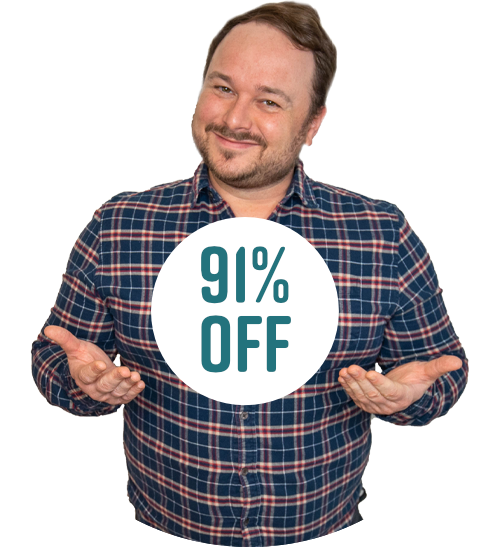






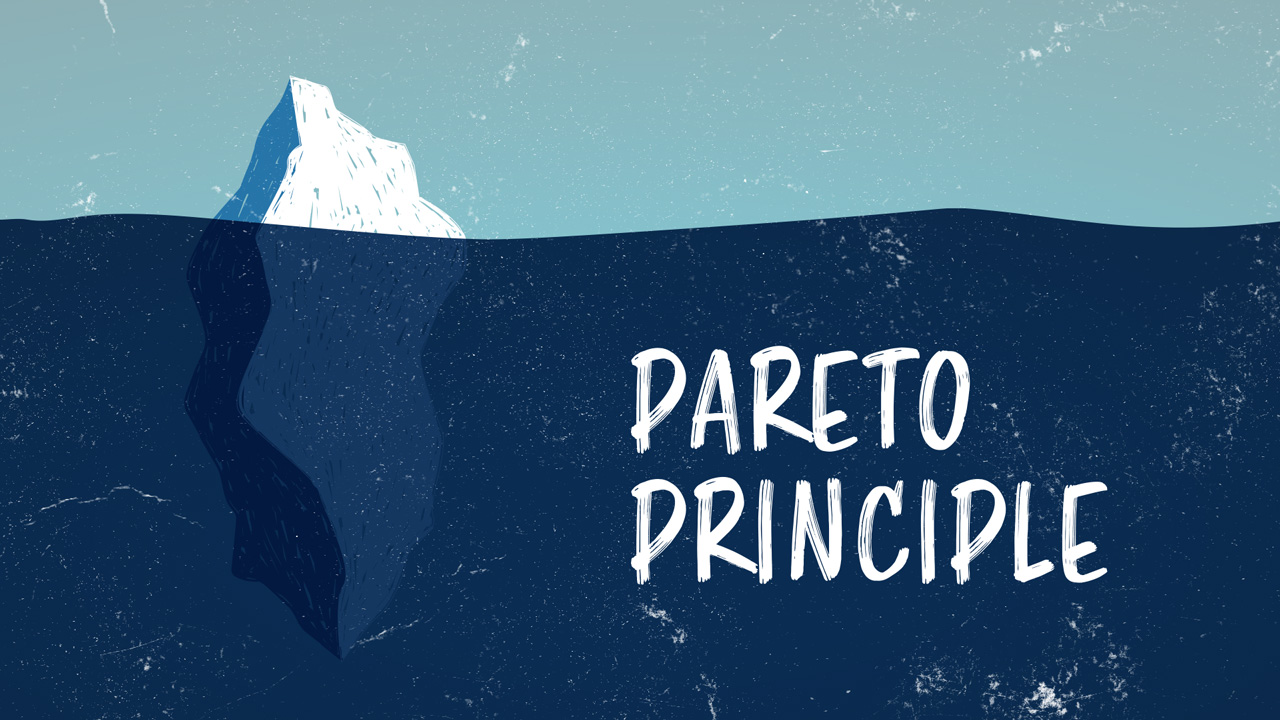
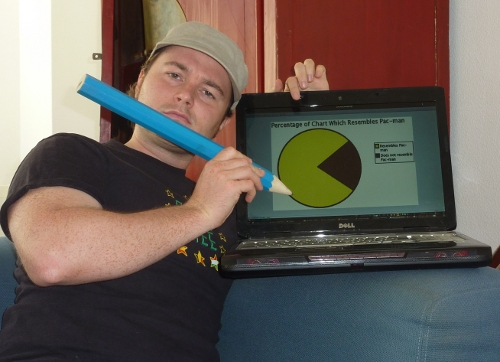
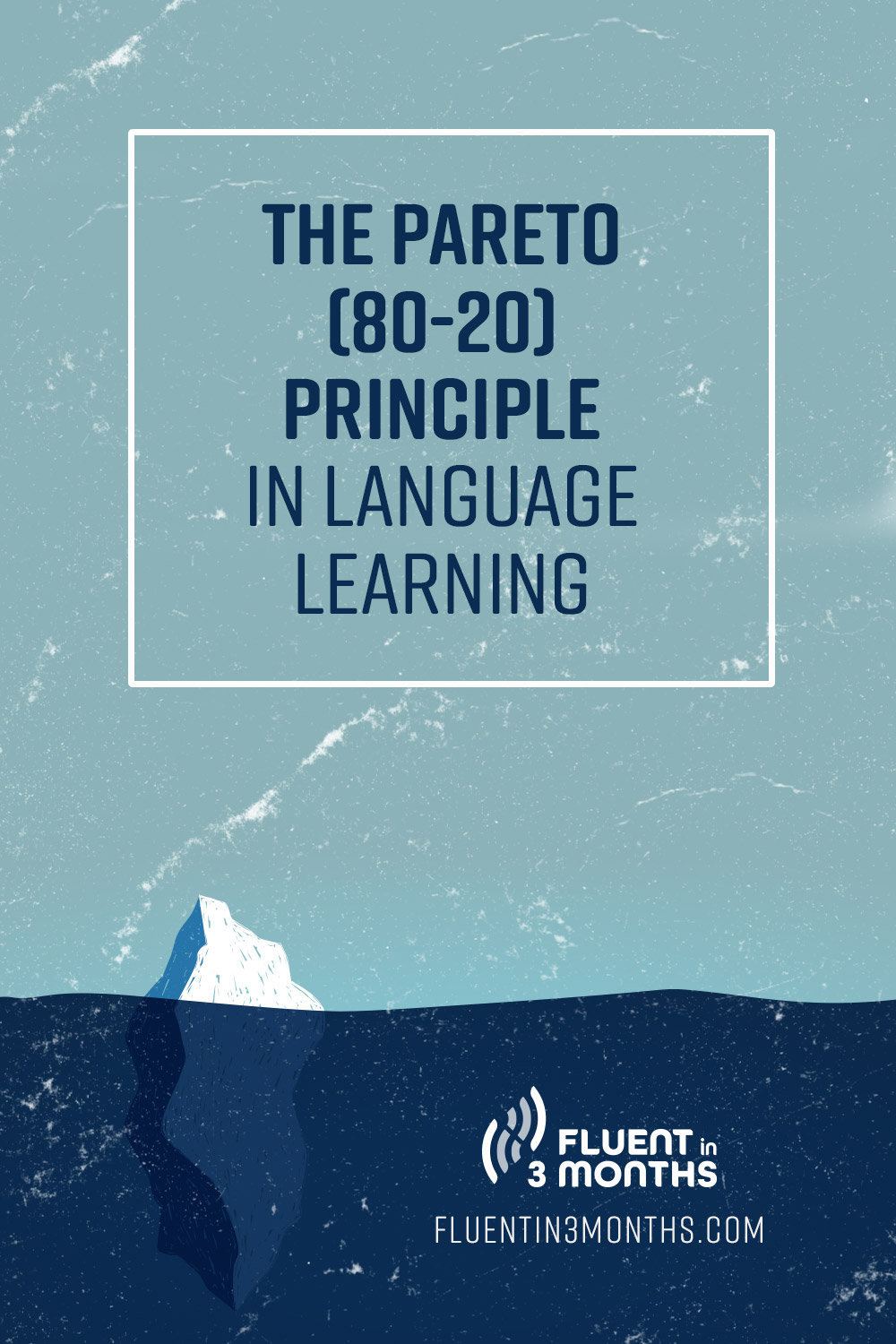

Social